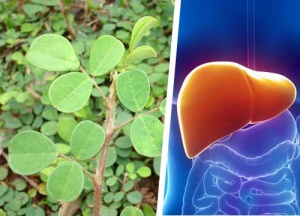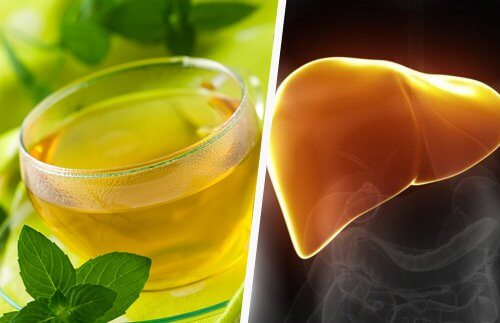This is a Beneficial Plant for Liver Health

Its name is a little difficult to pronounce, but it’s worth saying it if you can get the benefits of this great plant for liver health. It’s called Desmodium Adscendens and it’s found growing under the palms in the humid regions of Equatorial Africa. Meet the plant that’s can be good for your liver in the following article.
Learn about Liver Function
Before introducing this incredible plant for liver health, we should go over a few things about the liver and its functions. The liver works non-stop to keep you healthy and alive, regulating the body and cleansing it of toxic substances. It synthesizes proteins and filters out harmful substances that have been ingested via food and drink.
You might also like:
Keep Your Liver Healthy the Natural Way
The liver is the largest and most complex internal organ in the human body. It performs over 500 functions. In conjunction with the gallbladder, it’s responsible for regulating the metabolism, absorbing vitamins, hormone regulation and more.

The liver has the power to regenerate itself if given the right building blocks. This organ can adapt to new situations. It has been known to carry out its functions after being partially removed due to illness or injury. For this to occur, at least 25% of the liver must be healthy.
Nevertheless, it’s extremely sensitive and degenerates faster than any other organ. Consuming alcohol or too much fat, along with certain illnesses or disorders, can leave the liver in poor shape. In this case, the liver is unable to perform its challenging tasks.
Also Read: Dinners for Losing Fat
Desmodium adscendens: an amazing plant for liver health
Herbal medicine offers many natural remedies for improving liver function. Just some examples of these are milk thistle, dandelion, black radish and wild artichoke. However, Desmodium adscendens is a lesser-known plant for liver health.

This species grows in Africa and has bright green leaves. You can find its creeping stems winding up coconut or palm trees. The plant produce light purple blooms followed by fruits up to 10 inches long. Some people refer to it as “Amor seco,” which means “dry love.”
People in places like Senegal, the Ivory Coast, and the Congo have been using it for centuries. In Ghana, for example, it’s used in natural medicine by healers of the region. It was discovered by modern medicine in 1960 by two French doctors who were doing humanitarian work in the region.
These days, some people recommend the plant for patients with hepatitis. Local healers have quite a bit of faith in this plant this plant. Beyond the local, several samples have undergone laboratory analysis. The results show that Desmodium adscendens contains alkaloids, saponins, flavonoids, and anthocyanins, which are all beneficial compounds.
Historical and current popularity
Clinical trials conducted in England, France, and Canada found that this plant had beneficial qualities for the liver. Desmodium has the ability to improve the regulation of enzyme levels in the liver and relax and smooth muscle tissue. In addition, it works as a bronchodilator and possesses antihistamine properties.

This powerful plant is an excellent natural complement to liver treatments for conditions caused by viruses, chemicals, or drugs and alcohol. And as if that weren’t enough, it helps the immune system as well, making it ideal for patients with diseases like HIV.
Traditional healers have employed desmodium adscendens in treatments for the symptoms of hepatitis. Some of these symptoms are jaundice, headache, fatigue, and loss of appetite. The traditional use of this plant in the treatment of epilepsy has also caught the curiosity of some researchers.
How to use the desmodium adscendens plant for liver health
You can find this amazing plant in herbalist shops and natural food stores. It doesn’t matter whether you get it in dry form, as an extract, a tincture, or as a capsule. To increase its potency, you can combine it with other medicinal plants like rosemary or milk thistle.
This plant has laxative properties.
If you’re suffering from a liver ailment, give 6-10 grams of the dried plant in a liter of water a try. Give the treatments a few weeks to see if they have a positive effect on your health.
Those who have taken liver-damaging pills as part of a treatment for conditions like nail fungus might find drinking some Desmodium before, during, and after treatment to be helpful to recovery. The proper dosage is 6 grams per liter of water.
If you want to take advantage of the purported benefits of this wonder-plant for liver health, take about 10 grams daily for a few months. Those with allergies should try less grams per day as a tea.
All cited sources were thoroughly reviewed by our team to ensure their quality, reliability, currency, and validity. The bibliography of this article was considered reliable and of academic or scientific accuracy.
- Céline François, Mourad Fares, Claudio Baiocchi, Jean Michel Maixent, “Safety of Desmodium adscendens extract on hepatocytes and renal cells. Protective effect against oxidative stress”, J Intercult Ethnopharmacol. 2015 Jan-Mar; 4(1): 1–5.
- François Nsemi Muanda, Jaouad Bouayed, Abdelouaheb Djilani, Chunyan Yao, Rachid Soulimani, Amadou Dicko, “Chemical Composition and, Cellular Evaluation of the Antioxidant Activity of Desmodium adscendens Leaves”, Evidence-Based Complementary and Alternative Medicine, Volume 2011, Article ID 620862, 9 pages
- Addy, M.E., et al., 1984. “Effects of the Extract of Desmodium adscendens on Anaphylaxis.” Journal of Ethnopharmacology, Vol 11 3:282-292 (1984).
- Boye, G &Ampopo, O, 1990. “Plants and Traditional Medicine in Ghana,” Economic and Medicinal Plant Research. Vol 4, pp 33-34 Academic
This text is provided for informational purposes only and does not replace consultation with a professional. If in doubt, consult your specialist.








